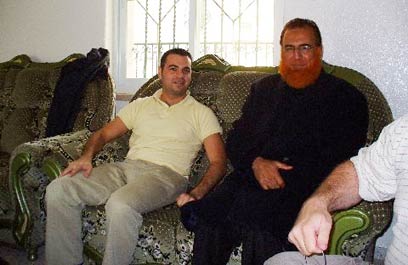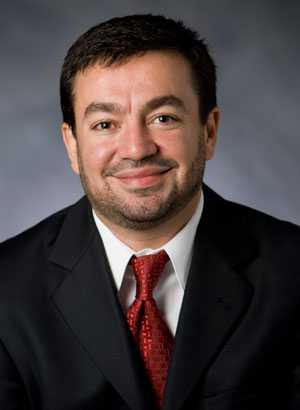By SHELDON KIRSHNER, Staff Reporter
Wednesday, 08 April 2009
Walter Fischel, an American academic, visited the Jews of Kurdistan in the 1940s. “Such Jews,” he exclaimed with a sense of wonder. “Men virile and wild-looking. Women wearing embroidered turbans, earrings, bracelets, even ring-noses, and with symbols tattooed into their faces…”
Roughly 25,000 Jews lived in Kurdistan back then, 18,000 in Iraq and the rest in Iran, Syria and Turkey.
Largely illiterate but famous as gifted storytellers and speaking the ancient language of Aramaic, Kurdish Jews were found in some 200 Muslim villages and towns throughout the Middle East on the eve of Israel’s establishment.
Ariel Sabar, an American journalist, has more than a passing knowledge of this exotic Jewish community, most of whose members immigrated to Israel in the early 1950s.
Sabar, in My Father’s Paradise: A Son’s Search for His Jewish Past in Kurdish Iraq (Algonquin Books), produces a family history and a portrait of Kurdish Jews in this richly documented volume.
As the title suggests, the book turns on his father, Yona, a linguist, researcher and professor of Hebrew at the University of California in Los Angeles.
Born in the northern Iraqi town of Zakho, in the heart of Iraq’s Kurdish region, but raised in Israel, Yona Sabar has published more than 90 monographs and two books on Aramaic – a nearly extinct language today – and the folklore of Kurdish Jews.
Despite his father’s international reputation as a scholar, Sabar did not appreciate his accomplishments and was even ashamed of him.
“I swore horribly in front of him, ridiculed him behind his back and took pains to avoid him, to be nothing like him,” he readily admits.
Sabar, who was born in Los Angeles, wanted to be part of what he describes as “the California mainstream,” and since his father rejected that ethos, father and son, like oil and water, did not mix.
“When we collided, it wasn’t pretty,” he writes in this frank and pungent memoir. “I threw tantrums and unleashed hailstorms of four-letter words. He stewed privately over how any son could behave that way toward his father, then consoled himself with the hypothesis that this was how children were in America.”
The cultural clash he alludes to forms but a segment of the core of My Father’s Paradise. In the final pages, Sabar comes to terms with him as he reclaims his heritage and visits Zakho.
The Jews of Zakho lived among 26,000 Kurdish Muslims and were concentrated in the mahala Juheeya, the oldest district, on an island on the Habur River. “Their mud-brick houses lined narrow alleys that zigzagged down to the river,” Sabar writes.
Since they were so isolated, they spoke Aramaic, the lingua franca of the Middle East until Arab armies from Arabia conquered Mesopotamia in the 17th century.
By all accounts, Jews and Kurds lived in harmony until Israel’s creation in 1948. To the Jews of Zakho, Sabar observes, Zionism represented, among other things, hopes for a better life and unease over the breakdown of Jewish-Muslim relations.
The first Jews to make aliyah were the have-nots – the small peddlers, the porters, the beggars. “Most carried only the rags on their backs and perhaps a single clay bowl,” says Sabar.
Once Sabar’s family was ready to leave in 1951, the Iraqi government passed a law that cancelled the citizenship and froze all the assets and property of departing Jews.
Sabar’s father was 13 years old when he and his parents and siblings left the country of their ancestors.
“The end arrived suddenly,” Sabar writes. “A line of motor coaches rolled into town early one April morning, and word went out that the time had come. Under a sky still full of stars, Jewish families, anxious and bleary, dragged suitcases and children out front doors and into cramped alleys that led to the main street.”
Hundreds of Kurds bid farewell to their Jewish neighbours, but the atmosphere was very different in Baghdad. “At the airport, angry mobs pressed against the barricades, hurling curses.”
Life was hard for Sabar’s family in Jerusalem, particularly for his grandmother: “Her relatives bought her a washing machine and stove, but the controls confounded her… She trudged off to night classes to learn Hebrew, but quit in frustration after two years, scarcely able to distinguish the letters of the alphabet. She had never learned to read or write her mother tongue. Why did people think she could master a second language?”
Sabar’s father, Yona, was more adaptable. A good student, he graduated from the Hebrew University with a BA in Hebrew and Arabic. Nevertheless, he felt that Kurdish Jews were patronized by the Ashkenazi elite, and he wondered whether he could pursue a scholarly career in Israel.
He was thus only too pleased to accept a scholarship from Yale University, where he plumbed the depths of Aramaic and met his wife.
In 1972, a year before Sabar was born, he was offered a position at the University of California. And there he thrived.
“The Promised Land had been a disappointment,” Sabar writes in a reference to Israel. “It had broken his father and his grandfather. It had humiliated and infantilized his mother. A generation of Kurdish Jews had been spit on by a society that should have known better.”
Yona Sabar’s success as an up-and-coming scholar did not spoil him, but his plain, unpretentious mien, his cheap clothes and his malapropisms in English alienated his insecure son.
“I didn’t know it as a boy, but he was almost single-handedly turning the field of Neo-Aramaic from a marginal curiosity to one commanding serious and growing attention at major academic conferences,” Sabar adds.
After Sabar himself became a father, he learned to value his father and his achievements and quit his job so that he could explore the lost world of Iraqi Kurdish Jews on a spiritual journey.
Having convinced his father to accompany him, the pair set off. They arrived in Zakho after Iraq’s dictator, Saddam Hussein, was unseated by the United States and its allies.
To Sabar, the purpose of the trip was crystal clear: “We could repair our relationship over cups of cardamom tea at cafés by the Habur River. We could walk together through the streets of the old Jewish neighbourhood, summoning the spirits of our ancestors… He would at last see me for the better son I had become.”
And so, as Sabar relates in this intriguing book, father and son finally bonded.
Source: www.cjnews.com, 08 April 2009
 Klein with Hamas’ number two in the West Bank, Muhammad Abu Tir (Photo: WND Books)
Klein with Hamas’ number two in the West Bank, Muhammad Abu Tir (Photo: WND Books)



![Enduring voices [Editor's Column] 5 Enduring voices [Editor’s Column]](https://www.turkishnews.com/en/content/wp-content/uploads/2009/04/andrew-silow-carroll.jpg)


 Soner Cagaptay
Soner Cagaptay